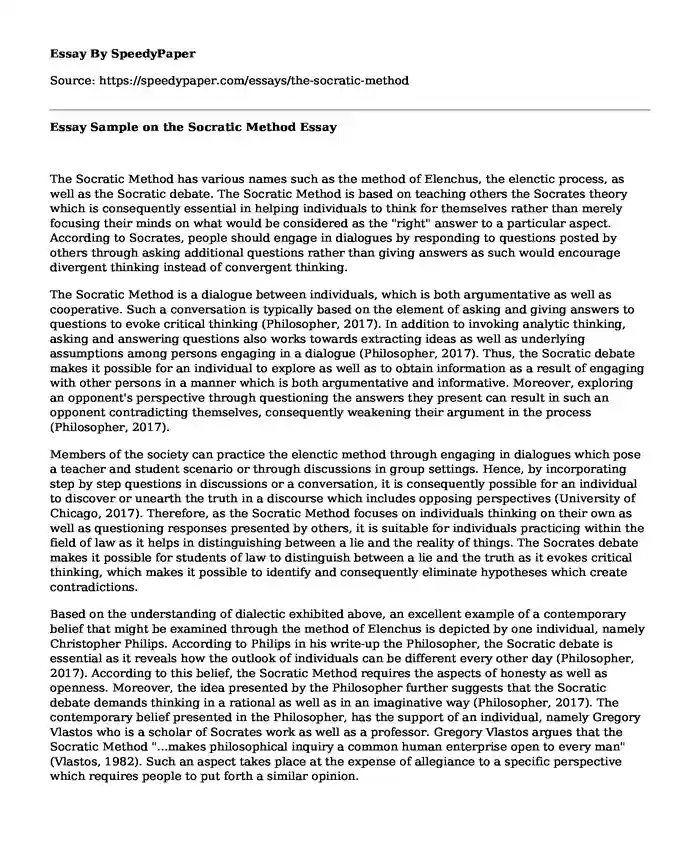
| Type of paper: | Essay |
| Categories: | Intelligence Personality Philosophers Human development |
| Pages: | 3 |
| Wordcount: | 656 words |
The Socratic Method has various names such as the method of Elenchus, the elenctic process, as well as the Socratic debate. The Socratic Method is based on teaching others the Socrates theory which is consequently essential in helping individuals to think for themselves rather than merely focusing their minds on what would be considered as the "right" answer to a particular aspect. According to Socrates, people should engage in dialogues by responding to questions posted by others through asking additional questions rather than giving answers as such would encourage divergent thinking instead of convergent thinking.
The Socratic Method is a dialogue between individuals, which is both argumentative as well as cooperative. Such a conversation is typically based on the element of asking and giving answers to questions to evoke critical thinking (Philosopher, 2017). In addition to invoking analytic thinking, asking and answering questions also works towards extracting ideas as well as underlying assumptions among persons engaging in a dialogue (Philosopher, 2017). Thus, the Socratic debate makes it possible for an individual to explore as well as to obtain information as a result of engaging with other persons in a manner which is both argumentative and informative. Moreover, exploring an opponent's perspective through questioning the answers they present can result in such an opponent contradicting themselves, consequently weakening their argument in the process (Philosopher, 2017).
Members of the society can practice the elenctic method through engaging in dialogues which pose a teacher and student scenario or through discussions in group settings. Hence, by incorporating step by step questions in discussions or a conversation, it is consequently possible for an individual to discover or unearth the truth in a discourse which includes opposing perspectives (University of Chicago, 2017). Therefore, as the Socratic Method focuses on individuals thinking on their own as well as questioning responses presented by others, it is suitable for individuals practicing within the field of law as it helps in distinguishing between a lie and the reality of things. The Socrates debate makes it possible for students of law to distinguish between a lie and the truth as it evokes critical thinking, which makes it possible to identify and consequently eliminate hypotheses which create contradictions.
Based on the understanding of dialectic exhibited above, an excellent example of a contemporary belief that might be examined through the method of Elenchus is depicted by one individual, namely Christopher Philips. According to Philips in his write-up the Philosopher, the Socratic debate is essential as it reveals how the outlook of individuals can be different every other day (Philosopher, 2017). According to this belief, the Socratic Method requires the aspects of honesty as well as openness. Moreover, the idea presented by the Philosopher further suggests that the Socratic debate demands thinking in a rational as well as in an imaginative way (Philosopher, 2017). The contemporary belief presented in the Philosopher, has the support of an individual, namely Gregory Vlastos who is a scholar of Socrates work as well as a professor. Gregory Vlastos argues that the Socratic Method "...makes philosophical inquiry a common human enterprise open to every man" (Vlastos, 1982). Such an aspect takes place at the expense of allegiance to a specific perspective which requires people to put forth a similar opinion.
Therefore, it would be appropriate to state that the Socratic Method is an essential factor for establishing the truth in dialogue. As exhibited, the method makes it possible to explore as well as to obtain information as a result of engaging with other persons in a manner which is both argumentative and informative. Moreover, the Socratic Method further makes it possible to discover or unearth the truth in a discourse which incorporates opposing perspectives.
References
Philosopher. (2017). What is the Socratic Method? Retrieved from http://www.philosopher.org/Socratic_Method.html
University of Chicago. (2017). The Socratic Method. Retrieved from https://www.law.uchicago.edu/socratic-methodVlastos, G. (1982). The socratic elenchus. The Journal of Philosophy, 79(11), 711-714. Retrieved from https://www.pdcnet.org/jphil/content/jphil_1982_0079_0011_0711_0714
Cite this page
Essay Sample on the Socratic Method. (2023, Jan 09). Retrieved from https://speedypaper.com/essays/the-socratic-method
Request Removal
If you are the original author of this essay and no longer wish to have it published on the SpeedyPaper website, please click below to request its removal:
- Free Essay Sample on Cracking Passwords
- Drunk Driving
- Analytic Essay Sample: Correlation between the Psychological Welfare of a Person and His Health
- Free Essay on Stress Causes for Students
- Free Essay Example about Employees' Discrimination
- Free Essay on the Impact of the French Revolution and Enlightenment on the Haitian Revolution
- Using Humans for Research. Paper Sample
Popular categories




